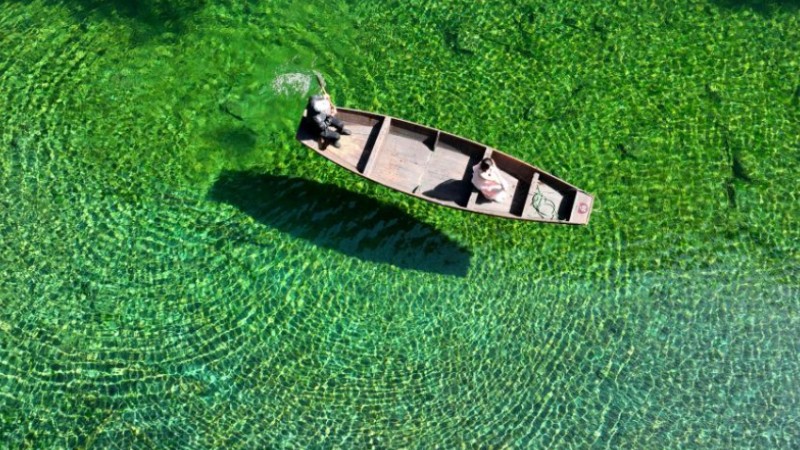Japan's nuclear-contaminated water discharge plan extremely irresponsible
Groups of Japanese citizens recently gathered in front of the headquarters of Tokyo Electric Power Company (TEPCO) and the Prime Minister's Office of Japan to protest against Japan's nuclear-contaminated water discharge plan.
They believe that it is criminal behavior to discharge the wastewater from Fukushima into the ocean.
However, the Japanese government has turned a deaf ear to the authoritative opinions from international organizations and dissenting voices both at home and abroad. It accelerated the construction of relevant facilities, claiming that it would not change its radioactive dumping plan this spring or summer.
The Japanese plan, which ignores the global marine environment and public health, is an extremely irresponsible practice.
It is reported that the wastewater discharge plan could take as long as 30 years. However, Japan has not yet provided ample scientific and factual proof to support the validity of its plan, and has not addressed the international community's concerns over the legitimacy of the discharge plan, the reliability of data, the efficacy of the treatment devices and the uncertainty of environmental impact.
TEPCO, which is in charge of the plan, has a notorious record of concealing the truth and tampering with information. As early as April and May 2011, it dumped some radioactive water into the ocean, which has long discredited the country.
Kenichi Oshima, a professor at Ryukoku University, noted that TEPCO has only selected a small part of more than 1,000 nuclear wastewater storage tanks for testing in the power plant, and all the tests were done by the company itself without third-party verification.
The American journal Science also pointed out that TEPCO's explanation lacked adequate evidence and was not trustworthy.
Suh Kune-yull, a professor emeritus of Nuclear Energy System Engineering at Seoul National University, said that digging an artificial lake of 200,000 square meters can fully meet Japan's demand for dumping wastewater for the next 50 years. Japan could have chosen a better option, yet it has transferred the responsibility it should bear to all humankind, which is tantamount to launching a terrorist attack on the Pacific Ocean.
The marine environment concerns the interests of the entire international community. Discharging nuclear-contaminated water into the ocean is by no means a domestic affair for Japan.
After the dumping plan was announced, multiple countries including China, South Korea, Russia and the Philippines as well as relevant international organizations have expressed their concerns.
The Japanese government and TEPCO had pledged not to dispose of the nuclear-contaminated water without the understanding of the parties concerned, but now they insist on going against their promise.
Secretary general of the Pacific Islands Forum (PIF) Henry Puna noted that the Japanese government had promised to stay in communication with Pacific Island countries on this matter and that the PIF would have access to all independent and verifiable scientific evidence. He said that so far, unfortunately, Japan has not been cooperating and that they are breaking the commitment.
New Zealand sociologist Karly Burch from the University of Auckland noted that "Pacific peoples have a fundamental right to a clean, healthy, and sustainable environment. By proceeding with this plan to discharge radioactive wastewater, the Japanese government is showing direct disregard for the sovereignty and self-determination of Pacific peoples."
The Japanese side should respect the legitimate concerns of the international community, keep its word and dispose of the contaminated water in a responsible manner.
Japan is a party to the United Nations Convention on the Law of the Sea, the London Dumping Convention, the Convention on Early Notification of a Nuclear Accident, the Convention on Nuclear Safety and the Joint Convention on the Safety of Spent Fuel Management and on the Safety of Radioactive Waste Management. By forcing the discharge plan, the country has seriously breached its obligations under international law.
The International Atomic Energy Agency has neither completed its assessment of Japan's discharge plan nor drawn concrete conclusions, and all its three reports published so far pointed out the plan's non-compliance with the agency's safety standards and made recommendations for improvement.
The disposal of contaminated water spans a long time with many uncertainties. Japan should allow effective international supervision of wastewater discharge. Attempting to solve the problem by simply dumping the wastewater, Japan will never be trusted by the international community.
Over the recent years, the international community has strongly doubted and opposed the wrong unilateral decision of the Japanese government to discharge contaminated water into the ocean. The UN Security Council recently convened an open debate on sea-level rise and its implications for international peace and security, during which representatives from multiple countries voiced criticism of Japan's steps to advance the discharge plan.
The PIF Special Leaders' Retreat reiterated that Japan should guide its political decision to discharge treated radioactive wastewater into the ocean with science and data.
Many Japanese citizens also oppose the irresponsible practice of Japan. Over 90 percent of Japanese people believe the discharge would trigger negative results.
The National Fisheries Cooperative Federation of Japan and other civil society groups condemned the government for breaking promises and ignoring fishers' interests.
The Japanese side ignored the legitimate concerns and appeals of the international community and its people, which will surely be condemned by the international community.
Japan should face up to the legitimate concerns of all parties, faithfully fulfill its international obligations, have full and meaningful consultation with stakeholders, and dispose of the nuclear-contaminated water in a science-based, open, transparent and safe manner, so as to practically protect the marine environment and the health of people from all countries.
Japan must not start discharging the contaminated water into the ocean before reaching a consensus through full consultation with neighboring countries, relevant international agencies and other parties concerned.
(Zhong Sheng is a pen name often used by People's Daily to express its views on foreign policy and international affairs.)
Photos
Related Stories
- China calls on Japan-ROK relations to develop in direction conducive to regional peace, stability, prosperity
- Foreign entries to Japan in February up 88-fold year on year
- Japan monitors markets as stocks crash for 2nd day following U.S. banks' collapse
- How Tokyo Electric Power colluded with Japanese govt to push a plan to dump nuclear-contaminated wastewater?
- Japan's nuke wastewater discharge plan batters fishermen's livelihoods, angers global community
Copyright © 2023 People's Daily Online. All Rights Reserved.









